
Ascidia is a genus of tunicates in the family Ascidiidae.

Microcosmus is a genus of tunicates in the family Pyuridae, containing the following species:

Didemnum is a genus of colonial tunicates in the family Didemnidae. It is the most speciose genus in the didemnid family. Species in this genus often have small calcareous spicules embedded in the tunic and form irregular or lobed colonies. Some Didemnum species, including Didemnum vexillum and Didemnum perlucidem are considered invasive species. In early 2006, Didemnum vexillum was found covering a 230 km2 area of cobble habitat in Georges Bank off the coast of New England, and is classified as an invasive species of greatest concern in coastal areas throughout Europe, New Zealand, and North America. Didemnum sp. invasions have also been recorded in Canada, the Mediterranean, and the Netherlands.
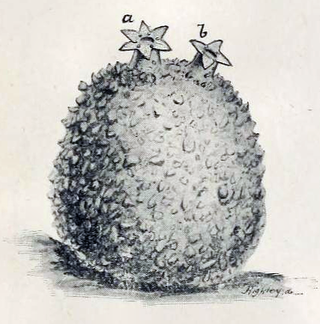
Molgula, or sea grapes, are very common, globular, individual marine tunicates roughly the size of grapes.

Clavelina is genus of sea squirts, containing the following species:
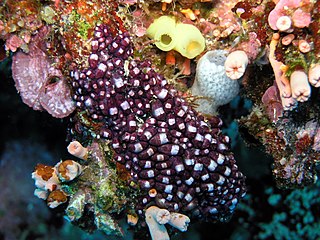
Eusynstyela is a genus of ascidian tunicates in the family Styelidae.

Phlebobranchia is an order of sea squirts in the class Ascidiacea, first described by Fernando Lahille in 1886.
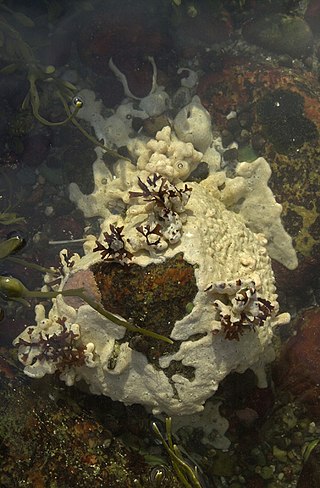
Aplousobranchia is an order of sea squirts in the class Ascidiacea, first described by Fernando Lahille in 1886. They are colonial animals, and are distinguished from other sea squirts by the presence of relatively simple pharyngeal baskets. This provides the etymology of their name: in ancient greek, ἁ.πλοος-ους (ha.ploos-ous) means "simple". The posterior part of the abdomen contains the heart and gonads, and is typically larger than in other sea squirts.

Aplidium is a genus of colonial sea squirts, tunicates in the family Polyclinidae. There are about 188 species in the genus found in shallow waters around the world.

Perophora is a sea squirt genus in the family Perophoridae. Most species are found in shallow warm water but a few are found in higher latitudes. A colony consists of a number of zooids which bud off from a long slender stolon.
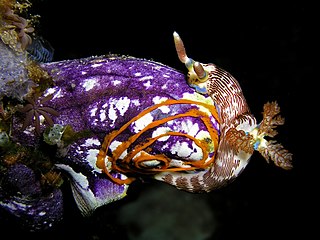
Polycarpa is a genus of ascidian tunicates in the family Styelidae.

Polyclinum is a genus of colonial sea squirts, tunicates in the family Polyclinidae.
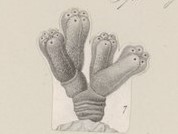
Synoicum is a genus of colonial sea squirts, tunicates in the family Polyclinidae.
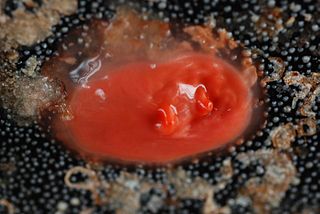
Cnemidocarpa is a genus of ascidian tunicates in the family Styelidae.
Monandrocarpa is a genus of ascidian tunicates in the family Styelidae.
Stolonica is a genus of ascidian tunicates in the family Styelidae.

Symplegma is a genus of ascidian tunicates in the family Styelidae.
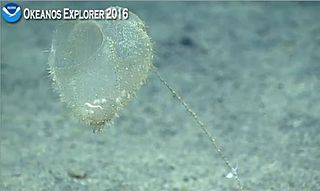
Culeolus is a genus of ascidian tunicates in the family Pyuridae.

Leptoclinides is a genus of tunicates belonging to the family Didemnidae. The genus has a cosmopolitan distribution.
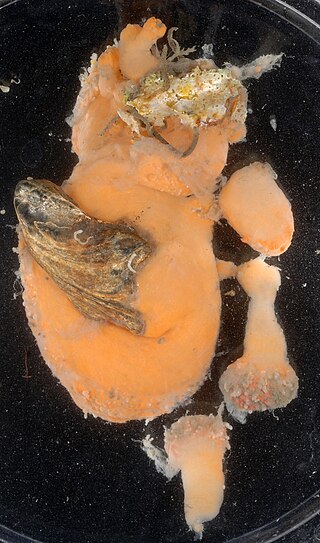
Distaplia is a genus of tunicates belonging to the family Holozoidae.
















